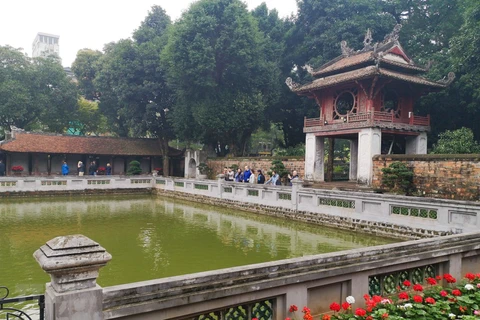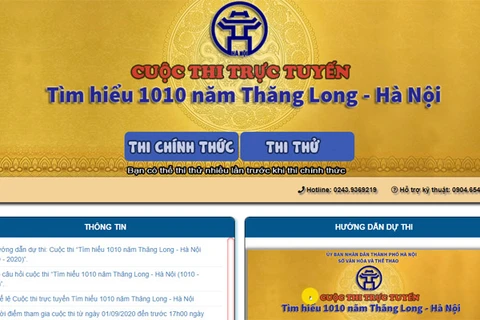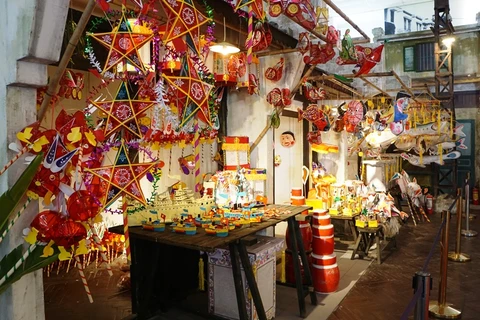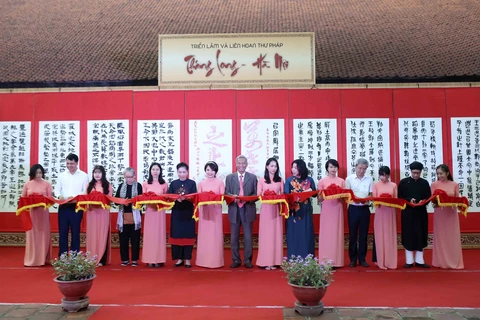 Doan Mon is one of the main entrances to the Thang Long citadel. Basing on construction materials and remaining architectural style of the relics, it can be affirmed that current Doan Mon was built under Le Dynasty and restored in Nguyen Dynasty. (Source: VNA)
Doan Mon is one of the main entrances to the Thang Long citadel. Basing on construction materials and remaining architectural style of the relics, it can be affirmed that current Doan Mon was built under Le Dynasty and restored in Nguyen Dynasty. (Source: VNA)  Doan Mon was built horizontally in U-shape. Doan Mon was built in the style of ancient city wall with five gates symmetrically erecting through a 'deity axis', also known as the 'righteousness axis' of the Imperial Citadel. (Source: VNA)
Doan Mon was built horizontally in U-shape. Doan Mon was built in the style of ancient city wall with five gates symmetrically erecting through a 'deity axis', also known as the 'righteousness axis' of the Imperial Citadel. (Source: VNA)  Situated at the heart of Hanoi, the Central sector of the Imperial Citadel of Thang Long is an outstanding place of interest not only for the capital city but also for the country as a whole.(Source: VNA)
Situated at the heart of Hanoi, the Central sector of the Imperial Citadel of Thang Long is an outstanding place of interest not only for the capital city but also for the country as a whole.(Source: VNA)  The standing monuments and subterranean vestiges of palaces, together with numerous other unique artifacts unearthed in the Central Sector of the Imperial Citadel of Thang Long-Hanoi are invaluable assets not only of Vietnam but also the entire human race.(Source: VNA)
The standing monuments and subterranean vestiges of palaces, together with numerous other unique artifacts unearthed in the Central Sector of the Imperial Citadel of Thang Long-Hanoi are invaluable assets not only of Vietnam but also the entire human race.(Source: VNA)  The site is one of the ten special national heritage sites proclaimed by the Prime Minister in 2009 and was inscribed on the World Heritage List by UNESCO’s World Heritage Committee in 2010. (Source: VNA)
The site is one of the ten special national heritage sites proclaimed by the Prime Minister in 2009 and was inscribed on the World Heritage List by UNESCO’s World Heritage Committee in 2010. (Source: VNA)  Its Outstanding Universal Values are reflected in its historical longevity, its continuous role as a seat of power, and its multiple cultural layers (Source: VNA)
Its Outstanding Universal Values are reflected in its historical longevity, its continuous role as a seat of power, and its multiple cultural layers (Source: VNA)  Visitors visit House D67, Zone A. The house was used as the Meeting room of the Politburo and Central Military Commission in the past. (Source: VNA)
Visitors visit House D67, Zone A. The house was used as the Meeting room of the Politburo and Central Military Commission in the past. (Source: VNA)  The relic site has become a must visit destination of both home and abroad tourists coming to the capital city. (Source: VNA)
The relic site has become a must visit destination of both home and abroad tourists coming to the capital city. (Source: VNA)  The World Heritage Site comprises two sections: the archaeological site at 18 Hoang Dieu Street and the central axis of the Nguyen Dynasty’s Citadel of Hanoi, which together create an integrated heritage complex (Source: VNA)
The World Heritage Site comprises two sections: the archaeological site at 18 Hoang Dieu Street and the central axis of the Nguyen Dynasty’s Citadel of Hanoi, which together create an integrated heritage complex (Source: VNA)  This was the most important sector of Thang Long Citadel, the capital of Dai Viet under the Ly, Tran, and Le dynasties from the 11th to the 18th centuries.(Source: VNA)
This was the most important sector of Thang Long Citadel, the capital of Dai Viet under the Ly, Tran, and Le dynasties from the 11th to the 18th centuries.(Source: VNA)  The relic site has become a must visit destination of both home and abroad tourists coming to the capital city. (Source: VNA)
The relic site has become a must visit destination of both home and abroad tourists coming to the capital city. (Source: VNA)  Visitors at Kinh Thien Palace. The palace is the central area among the overall vestiges in Thang Long – Hanoi Imperial Citadel. It used to be a palace of great significance where the court held the most solemn rituals, welcomed foreign emissaries and gave audience to discuss affairs of state (Source: VNA)
Visitors at Kinh Thien Palace. The palace is the central area among the overall vestiges in Thang Long – Hanoi Imperial Citadel. It used to be a palace of great significance where the court held the most solemn rituals, welcomed foreign emissaries and gave audience to discuss affairs of state (Source: VNA)  Way to Hau Lau (Princess Palace), the palace was built after the Later Le dynasty, the whereabouts for living and daily activities of the queen and the princess. Under the Nguyen Dynasty, Hau Lau was used as the residence of imperial concubines and followers who accompanied the King to Bac Ha (Source: VNA)
Way to Hau Lau (Princess Palace), the palace was built after the Later Le dynasty, the whereabouts for living and daily activities of the queen and the princess. Under the Nguyen Dynasty, Hau Lau was used as the residence of imperial concubines and followers who accompanied the King to Bac Ha (Source: VNA)  The relic site has become a must visit destination of both home and abroad tourists coming to the capital city. (Source: VNA)
The relic site has become a must visit destination of both home and abroad tourists coming to the capital city. (Source: VNA)  The relic site has become a must visit destination of both home and abroad tourists coming to the capital city. (Source: VNA)
The relic site has become a must visit destination of both home and abroad tourists coming to the capital city. (Source: VNA) VNA


























